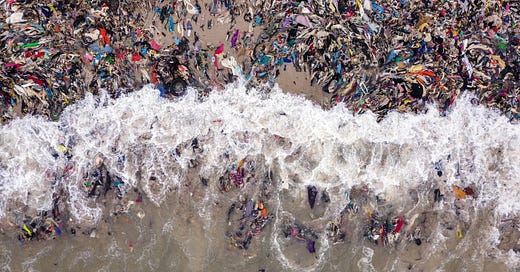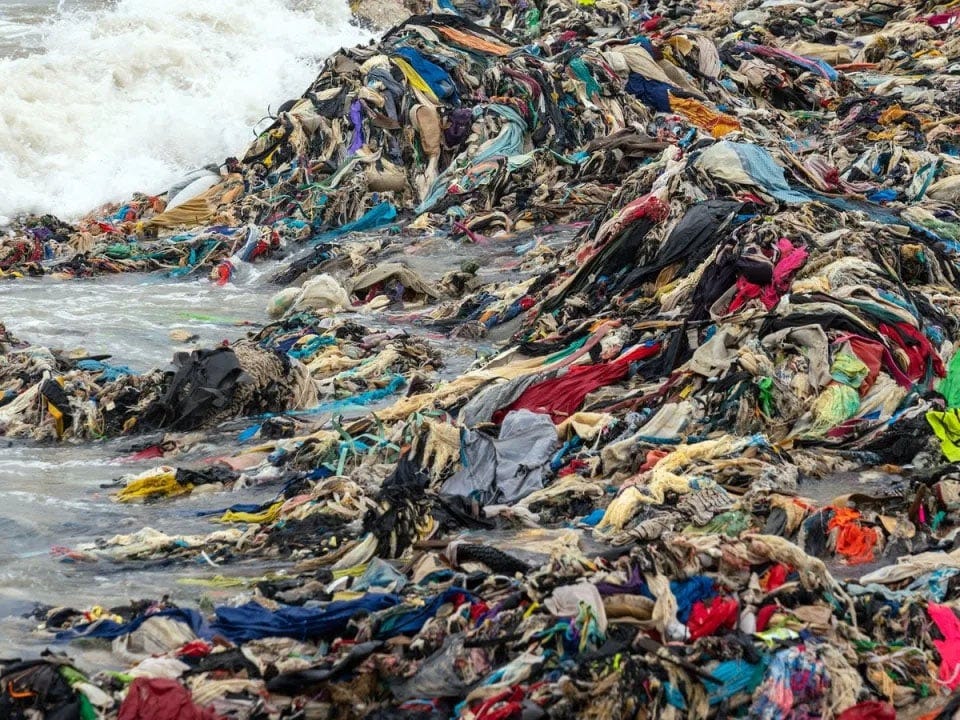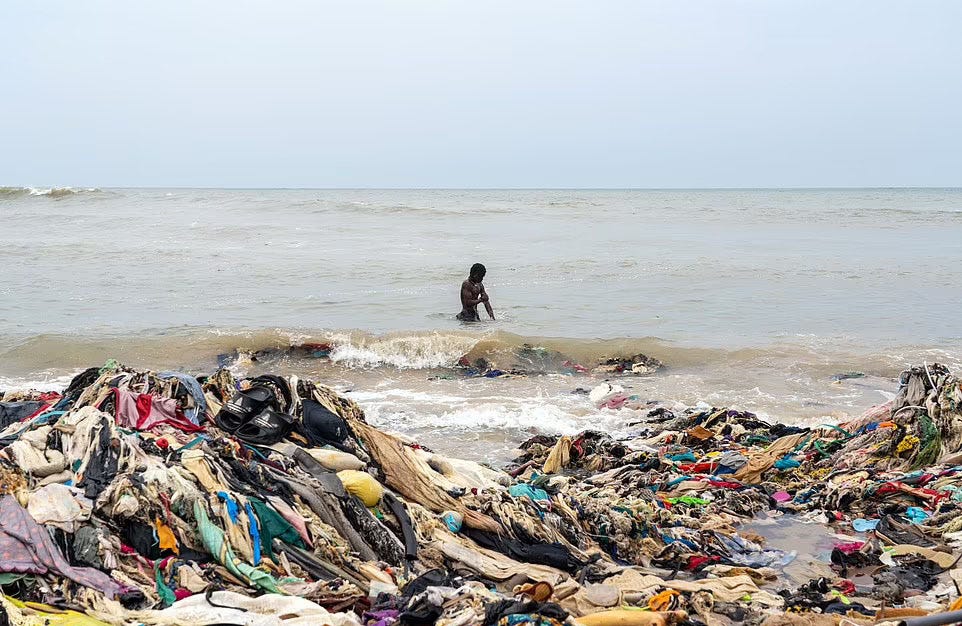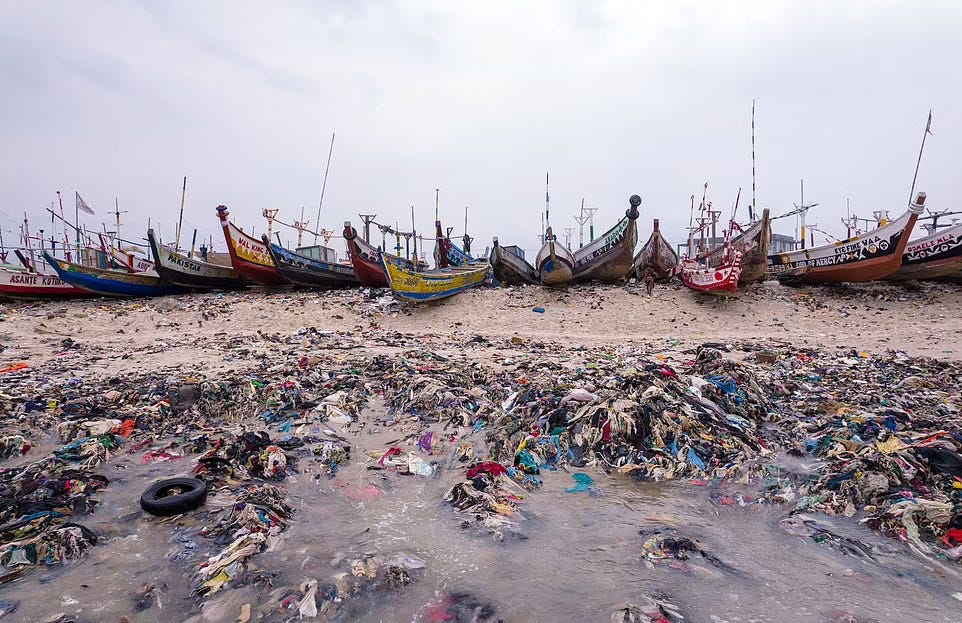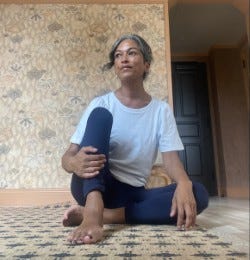Consequences of Your Actions
The consequences of our actions are neither abstract nor distant. They are tangible, visceral, and profoundly human.
Image: Muntaka Chasant
Nahid de Belgeonne, “the nervous system whisperer” is an Author and somatic movement educator. She specialises in helping clients through burnout, anxiety, and trauma-related issues with The Soothe Programme.
How are you doing? I’m in deep focus mode. It’s Winter, it’s been a full on year, I am gearing down to go slow and small over the darker months. Although I will be teaching at Six Senses in Portugal in the week after Christmas, it’s meant to be surrounded by stunning forests, I cannot wait! I’ve also started writing my thoughts down for my next book. I never thought I’d write one book, let alone get started on a new one. But I love long-form thinking and writing, it’s such an antidote to our fast-paced culture and social media. Which is why I love writing this newsletter. This week I have been thinking non-stop about The Or Foundation video “White deadman’s clothes”.
Image: Zara
The video doing the rounds on social media is the one showing the huge piles of sodden clothes being washed up on shore in Ghana.
Wave after wave of “white deadman’s clothes” imported from the US and other wealthy nations.
Secondhand clothing markets in Ghana are often framed as solutions to overproduction, yet this narrative masks the deeper issue: the unsustainable business model of the fashion industry.
The Global North’s deficit myth—that the Global South “needs” its castoffs—has led to unchecked dumping. This excess is mis-characterised as recycling, but it’s clear that Ghana has become a dumping ground for a crisis not of its making.
The consequences of this imbalance are profound. In Ghana, textile waste worsens public health crises, blocking gutters and increasing the risks of malaria and cholera. For the Global North, this waste remains out of sight and out of mind, allowing the cycle to continue.
The true beneficiaries of the fast fashion industry are the corporations profiting from its relentless cycle of production and consumption. This sector is notorious for its exploitation of labour, significant environmental pollution, and staggering amounts of waste.
Image: Muntaka Chasant
The environmental consequences are severe, with fast fashion contributing between 8% and 10% of global greenhouse gas emissions. As the industry continues to grow, these emissions are anticipated to rise sharply, amplifying its impact on the global climate crisis.
In the meantime, Shein adds 2000 new items to its website daily and Zara’s mission is to produce clothing from design to the shopfloor in 15 days. Consumers, caught in a loop of buying inexpensive clothing that quickly deteriorates, face constant pressure to replace items at an unsustainable pace.
I know a woman, in her thirties, who giggles as she tells me how many pairs of shoes she owns – 250 at the last count - and how she organises regular clearouts to charity shops to “pass them on” – without considering that her shopping habits are part of the problem, buying shoes that she will wear once and then discard.
Image: Zara
How did we get so disconnected from the consequences of our actions?
Every action we take sets off a ripple of influence. Like pebbles tossed into still waters, our choices disturb the equilibrium, creating waves that extend far beyond our immediate perception.
Philosophical and spiritual traditions have long emphasied this interconnectedness, highlighting the profound consequences of our actions - or inaction as seen in the response to a genocide - not just for ourselves but for the collective world.
The concept of karma, central to Hinduism, Buddhism, and Jainism, teaches that our deeds—whether virtuous or harmful—inevitably return to us, shaping the trajectory of our lives and the greater tapestry of existence.
In the modern era, over consumption, starkly exemplifies the karmic principle at a collective scale.
Spiritual Consequences
In spiritual terms, this overconsumption creates imbalance and debt. Karma reminds us that energy - whether created by intention or action - must balance itself.
When industries prioritise profit over sustainability, or when individuals purchase goods they don’t truly need, the invisible ledger of karma grows. The waste dumped in Ghana's landfills becomes more than just an environmental tragedy; it symbolises spiritual recklessness. By indulging in fleeting desires, we impose suffering elsewhere, often upon those least capable of defending themselves.
In essence, overconsumption disconnects us from dharma—the principle of cosmic order and righteousness. This disconnect manifests not only in physical consequences but also in the erosion of inner peace.
While the modern consumer may experience temporary satisfaction in acquiring a fast-fashion item, they unknowingly participate in a cycle that perpetuates suffering, both materially and spiritually.
This echoes the Buddhist teaching of dukkha (suffering), which arises when we cling to impermanent pleasures, mistaking them for lasting fulfilment.
Philosophically, our actions reflect our values. When we consume without consideration, we abdicate our moral responsibility to others and the planet.
Freedom comes with great responsibility.
Every purchase, every action, is a choice, and these choices define not only who we are but also the world we create. To knowingly engage in patterns of waste or exploitation while ignoring their broader impacts is to act in bad faith, denying our interconnectedness with humanity and nature.
The cascading consequences of our decisions mean that a discarded garment in a Western country isn't "disposed of" in any absolute sense—it merely changes location, often becoming a burden on someone else's doorstep. This interplay of cause-and-effect mirrors karma's emphasis on the inevitability of consequences.
How do you break the cycle?
A question I often ask my clients and myself before every action that is triggered by an emotion is…
“IS THIS INTENTIONAL?”
By cultivating awareness, compassion, and intentionality you align with the principle of ahimsa (non-harm), urging you to make choices that minimise suffering, both yours and for others and your environment.
It asks you to embrace an ethic of care, recognising that our existence is bound to others in a web of mutual dependence.
Practical actions—buying less, choosing sustainable brands, supporting circular economies, advocating for human rights—become acts of resistance against the destructive cycles of overconsumption and self-centred living.
The consequences of our actions are neither abstract nor distant. They are tangible, visceral, and profoundly human.
By reflecting on the spiritual and philosophical implications of our choices, we can move toward a more just and sustainable world—one where karma, rather than self-interest, becomes a force of healing and balance.
In this, we find hope: the same ripple effect that amplifies harm can also amplify kindness and responsibility. It is up to us to decide what kind of waves we intend to create.
Further reading/actions: Consumed by Aja Barber, The Or Foundation, The Clean Clothes Campaign and Buy Now!
For paid subscribers: I have uploaded a somatic meditation with your legs up the wall, it’s a practice that I have been using all week. I’ve also included an exercise of intention setting that I do every morning, after my breath practice. Give it a go and let me know how it keeps you on track.
Thank you for reading.
Stay human,
Nahid x
What’s going on?
Somatic Soothe Sunday 15th December at 5 pm ( LA 9 am NY 5pm) - the monthly live sessions are FREE to all paid subscribers
Breath to Calm: 30 Days to Soothing Anxiety - 30 days to set you up with a self- practice that will, reduce your levels of anxiety and lower your baseline of reactivity. £45 off if you buy by 25th November. Send me a YES and I’ll send you the payment details. The programme will launch on 30th November.
The next Soothe Day retreat in London is on 18th January, a few places left - Book here.
The Lefkada Retreat on 31st May - 7th June 2025 has 3 rooms left. More info here.
Check out the lessons in my book to soothe your brain and body.
Keep reading with a 7-day free trial
Subscribe to Soothe with Nahid de Belgeonne to keep reading this post and get 7 days of free access to the full post archives.


